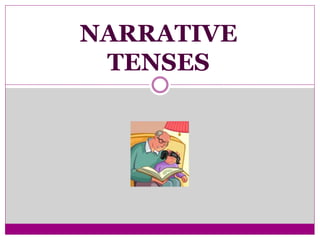
narrative-tenses_.ppt this is a grammar lesson about the narrative tenses
- 2. When we narrate a story, we use: PAST SIMPLE PAST CONTINUOUS PAST PERFECT PAST PERFECT CONTINUOUS WOULD/USED TO
- 3. We use narrative tenses when telling a story, or talking about situations and activities which happened at a past time. When telling past events, DO NOT mix past and present tenses
- 4. PAST SIMPLE TENSE We use simple past tense to express a completed action at a definite time in the past I woke up at half past seven yesterday, I had a shower and ate some breakfast. I I left home at quarter past eight. to express past habits. I woke up very early when I was a kid. I used to wake up very early when I was a kid. I would wake up early when I was a kid.
- 5. REMEMBER! 'WOULD' CAN NOT BE USED FOR PAST STATES! I used to live in London. We can’t say I would live in London.
- 6. PAST CONTINUOUS TENSE We use past continuous tense for an action which was in progress at a stated time in the past. At 1 o’clock in the morning, I was sleeping. For a past action which was in progress when an other action interrupted it. We use the past continuous for the action in progress (longer action) and the past simple for the action which interrupted the longer action. I was washing the dishes when I cut my finger.
- 7. For two or more actions which were happening at the same time in the past. I was cooking the dinner while my daughter was laying the table. To give background information in a story The sun was shining brightly and the birds were chirping happily as I was walking to work.
- 8. PAST PERFECT SIMPLE We use past perfect simple to go back to a second past. We use it to talk about things that had already happened before that specific time in the past. I got to the party late. When I arrived there, everybody had already left. We use it to make the narrative more interesting and easy to read.
- 9. PAST PERFECT CONTINUOUS We use past continuous tense to talk about longer actions or situations which had continued up to the past moment. When the teacher entered the classroom, the students had been fighting
- 10. TIME EXPRESSIONS Yesterday 2 days ago Last week today This week at 2 o’clock on Monday in March
- 11. TIME CLAUSES WHEN+SIMPLE PAST, SIMPLE PAST When I helped her complete her work, she thanked me. When I read the letter, I cried. WHEN+SIMPLE PAST, PAST CONTINUOUS When she called me, I was cooking the meal. When I met him, he was working in a hospital.
- 12. WHEN+SIMPLE PAST, PAST PERFECT/PAST PERFECT CONT. They had been touring the country for a month when we last saw them. When he arrived there, they had already gone. WHILE/AS/JUST AS+PAST CONT, SIMPLE PAST He fell asleep while I was cleaning the room. As we were walking by the sea, we noticed a huge bin near the small hut.
- 13. WHILE/AS/JUST AS+PAST CONT,PAST CONT As I was cleaning the kitchen, my sister was tidying the dining room. While you were reading the newspaper, I was working on my project. AS+SIMPLE PAST,SIMPLE PAST As I opened my eyes I heard a strange voice. The doorbell rang just as I picked up the phone.
- 14. JUST AS+BE ABOUT TO, SIMPLE PAST Just as I was about to resign from my position, I got promoted. Just as we were about to go out, it started to rain.
- 15. IT/THIS WAS THE FIRST/SECOND/THIRD....TIME+PAST PERFECT It was the last time we had seen each other. That was the last word she had said.
- 16. AFTER+PAST PERFECT/SIMPLE PAST, SIMPLE PAST She went to America after she graduated from school. After I had written the letter, I went out. BEFORE+SIMPLE PAST, PAST PERFECT/SIMPLE PAST I bought a lot of new clothes before I went to Italy. Before he got married, he had spent most of his time in Europe.
- 17. BY THE TIME+SIMPLE PAST, PAST PERFECT /PAST PERFECT CONT. By the time he published his first novel, He had written 10 short stories. By the time we arrived there, the movie had already begun. UNTIL/TILL+SIMPLE PAST+SIMPLE PAST/PAST PERFECT Until the war was won, a lot of innocent people had died. We waited until he finished his homework.
- 18. AS SOON AS/THE MOMENT/ONCE/IMMEDIATELY+PAST PERFECT/SIMPLE PAST,SIMPLE PAST As soon as I had seen her, I understood that something was wrong. Once she (had) decided to leave him, nobody was able to change her mind. Immediately we (had) stepped out, it started to rain. BY+PAST EXPRESSION+PAST PERFECT/PAST PERFECT CONT. By the mid 20th century, many women had gained the right to teach. By the end of the Great Depression, a lot of people died of hunger.
- 19. HARDLY/SCARCELY+PAST PERFECT(INVERSION) WHEN+PAST SIMPLE Hardly had I entered the classroom when I noticed a student on the floor. She had hardly left the doctor’s office when a car crashed her. NO SOONER+PAST PERFECT(INVERSION) THAN+SIMPLE PAST No sooner had I left the office than it started to rain. No sooner I had left the office than I caught a taxi.
- 20. Prepared Eva Büyüksimkeşyan Resources:Basic English Usage Enterprise Grammar